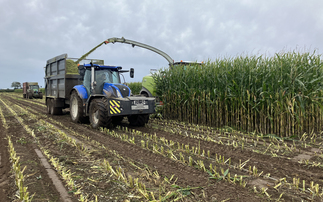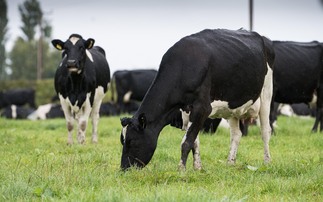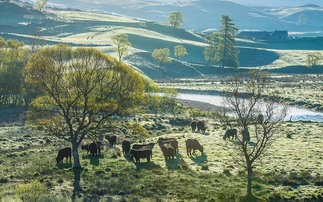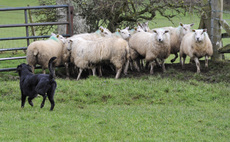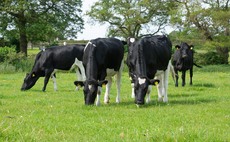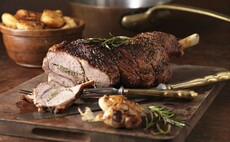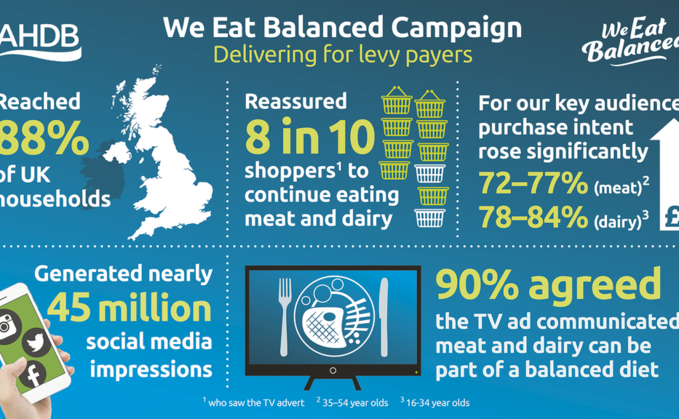
AHDBs dynamic TV advert has sparked heightened levels of confidence in British food production, as UK consumers are reassured to continue to enjoy meat and dairy as part of a healthy, balanced diet. Mollie Leach reports.
Hitting national TV screens as part of the We Eat Balanced campaign, the ad, which is set on-farm with an inquisitive little girl called Nancy and her grandad, has instilled more than 80 per cent of shoppers with the confidence to continue eating British meat and dairy.
With the two-month campaign (January 4 to February 27) focusing on how meat and dairy produced in the UK gets its goodness, Susie Stannard, AHDBs senior consumer insight analyst, said the results were reflective of the positive attitudinal shift among the waverer category of consumers.
She said: Consumer research highlighted that most people continue to enjoy meat and dairy, but consumers wanted a clear reason to justify their dietary choices, given the tide of negative headwinds around food production.
With a flurry of misinformation circulating, AHDBs bold messaging around the health benefits of red meat and dairy has helped to inject much-needed balance into the debate around food production.
Arming consumers with the facts, AHDBs TV ad reached 88 per cent of UK households to successfully create a drumbeat around the health benefits of red meat, with beef, pork, lamb and milk containing vitamin B12, an essential nutrient not naturally present in vegan foods.
Ms Stannard said: The results showed that 90 per cent of consumers agreed the TV ad communicated that meat and dairy can be part of a balanced diet.
Extolling the truth behind the nutritional value of red meat and dairy has therefore helped to move the conversation with UK consumers from one of reassurance to reappraisal, she added.
The campaign has played a vital role in counteracting sensationalist headlines and, instead, has driven positive perceptions of red meat and dairy, to boost confidence among UK consumers when lifting food from shelves.
But in a climate increasingly populated by a black and white approach to food, telling the story of food and farming has alsobeen central to the campaigns efforts to protect long-term attitudes around meat and dairy consumption.
Ms Stannard said: This is why AHDB has worked with farmers across the UK. By helping to tell their personal stories, the public is able to see how hard farmers work to produce high-standard, sustainable and healthy meat and dairy.
The impact of which has seen significant uplifts in consumer perceptions around higher production standards.
Perceptions
Following the campaign, consumer perceptions that meat and dairy in Britain is produced sustainably grew by 5 percentage points and 8 percentage points respectively.
Ms Stannard added: Impressively, among our key audiences purchase intent for meat rose by 5 per cent among 35- to 54-year-olds and by 6 per cent for dairy among 16- to 34-year-olds, showing the power of the campaign to make them think again about meat and dairy.
Seventy-three per cent of respondents even confirmed they would use the information they had seen to defend their dietary choices But the work does not stop there, Ms Stannard emphasised.
Trust
AHDB research shows that consumers trust farmers, but consumer attitudes are slow to change.
To enact a meaningful and long term shift in perceptions around meat and dairy, wider support across the supply chain will be integral going forward.
We will continue to work across our social media and digital platforms and collaborate to be consistent with our key messaging, which asserts the world-class food and farming standards as one of the most sustainable in the world and how meat and dairy can form part of a healthy, balanced diet.
SPOTLIGHT: JILLY GREED, BEEF FARMER, DEVON
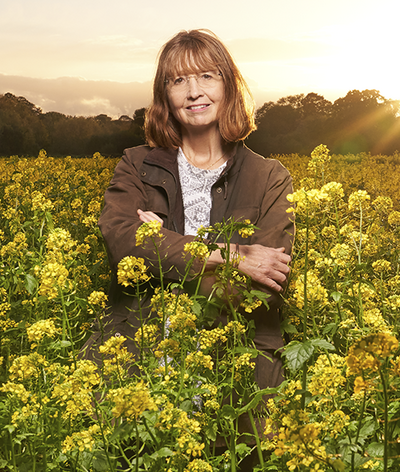
JILLY Greed, a beef farmer from the Exe Valley in Exeter, Devon, currently runs a 600-acre suckler beef and arable enterprise.
Utilising a regenerative systems approach on-farm in the move towards net zero, Ms Greed highlighted We Eat Balanced had shed a much-needed light on the crucial environmental work British farmers were doing to produce sustainable red meat.
Coining the campaign a bold initiative, Ms Greed said: The TV advert was successful in helping to dispel myths around food production from a sustainability perspective.
It can be hard for consumers to understand the processes of farming and portray them in a way which positively resonates with the media
and the public.
But the clear messaging around red meat as a source of B12, alongside the emphasis on our higher welfare and production standards which work perfectly with the UKs climate, struck a chord with the British public.
The campaigns ability to effectively convey the hard work of farmer through hard-hitting messages, has kick-started an important and on-going conversation about the story behind high-quality British food production.
Always present
We Eat Balanced has adopted an always present approach, which will be key to developing the campaign and growing on what has already been achieved.
Farmers really care about the food they produce and AHDB has helped to communicate this to the British public.
SPOTLIGHT: ABI READER, DAIRY FARMER, CARDIFF
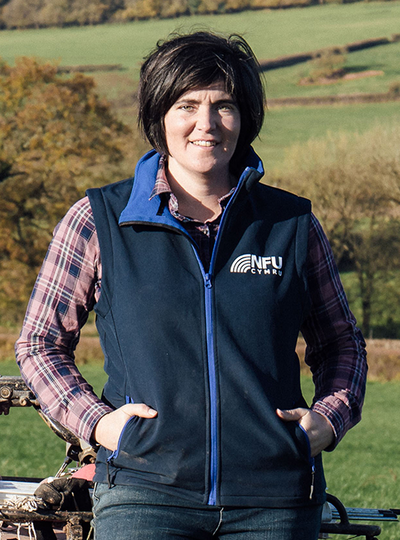
ABI Reader is a dairy farmer from Cardiff, milking 200 dairy cows over 304 hectares (750 acres), alongside 150 sheep, 100 beef cattle and an additional 61ha (150 acres) for combinable crops.
A keen advocate for the We Eat Balanced campaign, Ms Reader emphasised one of the biggest wins of the latest burst had been the effective messaging around the nutritional value of red meat and dairy.
Consumption
She said: The debate around the consumption of red meat and dairy in recent years has become increasingly polarised.
What the campaign has succeeded in doing is helping consumers to understand the importance of balance and the value of red meat and dairy as nutrient-rich foods.
The TV adverts friendly and light hearted portrayal of Nancy on-farm had also moved to shine a spotlight on the sustainability credentials of British meat and dairy production.
Ms Reader said: We live in a maritime climate, where our animals eat grass and rely on the rain, which means UK farmers are well positioned to farm in an environmentally-friendly way.
Going forward, Ms Reader added education would be key to protecting long-term positive attitudes towards red meat and dairy consumption.
Working together
She said: We need to work together with key organisations, such as AHDB, to connect with schools, the media and wider digital platforms to continue to push out key messaging around the world-leading standards of British food production.
You cannot say it once, these messages have to be consistently amplified.
SPOTLIGHT: FLAVIAN OBERIO, PIG FARMER, HAMPSHIRE
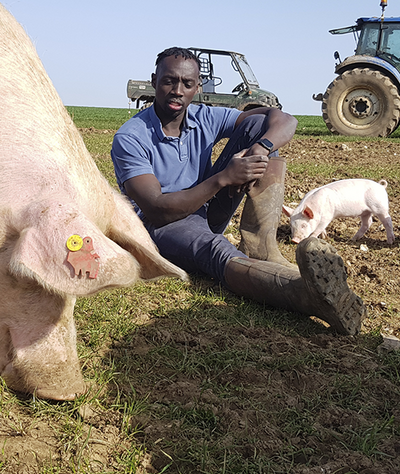
PIG unit manager Flavian Oberio, who runs a 130-sow outdoor-reared farrow to finish system, said AHDBs latest We Eat Balanced campaign had felt like a positive step change for the industry.
He said: The pig sector is in a critical situation, with every day presenting new challenges, but I think it is important for us to think about and focus on the long-term.
The campaign itself is different to many advertising campaigns out there it is not divisive, it is not telling people what they can and cannot eat, and it is not saying eat loads of meat, instead it is presenting the whole plate and educating consumers on the facts so they can make their own minds up.
Provenance
The customers who come into our farm shop are wanting the provenance, they want to know where their food comes from. So I think it is great we have campaigns such as We Eat Balanced to shout this message louder and wider for others to see and hear.
SPOTLIGHT: PHIL STOCKER, CHIEF EXECUTIVE OF THE NATIONAL SHEEP ASSOCIATION

Speaking about the success of the campaign, Phil Stocker highlighted the latest burst had been a fantastic new promotion for UK agriculture.
He said: By sharing positive messages and imagery with consumers, it is presenting an evidence-based and common sense approach to diets, and showcases our nations quality food, high production standards and values.
The public increasingly wants assurances over food choices and also to know where their food is coming from and how it is being produced.
Stories
Campaigns such as this allow farmers to share their stories, building trust between farmer and consumer and creating demand for UK produce.












